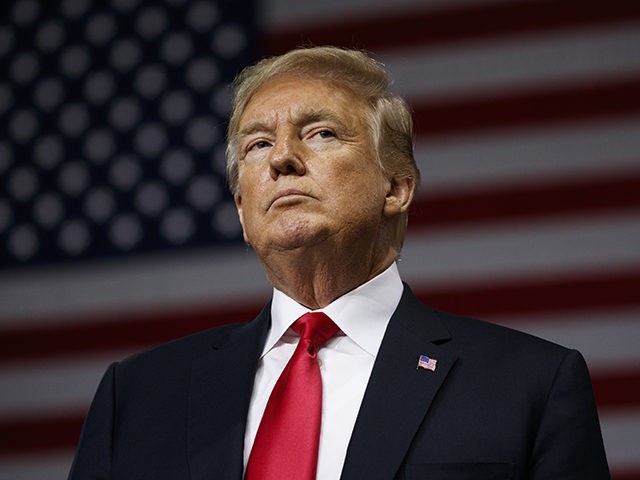President Donald Trump spurned the advice of establishment diplomats as he fought to implement his campaign promises, according to a report by Vox.
The November 7 article described the elected president’s decision to ignore the self-serving view of agency officials:
Senior State Department officials and career diplomats repeatedly warned the Trump administration that taking away legal protections for [400,000 migrants] from El Salvador, Honduras, and Haiti would put national security, foreign relations, and the immigrants’ American-born children at risk, according to internal State Department documents.
But Trump did it anyway — and concerns about the 2020 election appear to have helped determine the timeline for requiring immigrants to leave, according to the documents, which will be released in a report by the Senate Foreign Relations Committee [and Sen. Bob Menendez (D-NJ)] on Thursday.
Trump was elected president on an America First platform, and he has had to fight the establishment every day to implement his platform.
Vox is part of the establishment, so Vox’s shocked report about politicians overruling experts provides a useful Civics 101 lesson for American K-12 students: Presidents with change agendas will face strenuous opposition from the establishment.
Other reports show how Trump has had to fight the establishment. The New York Times, for example, described a showdown in the Oval Office where Trump demanded more effort to block migrants:
In the Oval Office that March [2019] afternoon, a 30-minute meeting extended to more than two hours as Mr. Trump’s team tried desperately to placate him.
“You are making me look like an idiot!” Mr. Trump shouted, adding in a profanity, as multiple officials in the room described it. “I ran on this. It’s my issue.”
…
The president’s advisers left the meeting in a near panic.
In the following months, Trump revamped his staff, fired top aides, fended off appeals from business lobbies, and then achieved a huge strategic success by threatening to impose tariffs on Mexico.
The Vox article also showed how the State Department is focused on its own priorities and rarely is willing to help fix other national problems if those fixes create problems for the diplomats. That self-serving attitude was spotlighted by the diplomats’ arguments against Trump’s plan to end the migrants’ Temporary Protective Status (TPS), as described in Vox:
Thomas Shannon, the most senior foreign service official in the State Department at the time, appealed to [then Secretary of State Rex] Tillerson to renew protections for immigrants from the three countries.
“It is rare for the State Department to be asked to comment on an issue with such immediate domestic political ramifications,” he wrote in a previously undisclosed memo in October 2017. “I understand the delicate nature of the decision. However, it is our purpose to provide the best possible foreign policy and diplomatic advice. From my point of view, that advice is obvious: extend TPS for the countries indicated.”
…
Given that most Hondurans who migrate do so for economic reasons, adding tens of thousands of deportees to an economy that is not prepared to integrate them will only exacerbate the principal cause of irregular migration,” Heide Fulton, then-interim head of the US Embassy in Honduras, wrote in a June 29, 2017, diplomatic cable. “This would impose severe burdens on a cooperative but underresourced [Honduran government] and be counterproductive to US interests.”
In October, Trump won a migrant-reduction deal with El Salvador by offering to partially extend TPS for El Salvadorean migrants now living in the United States. That diplomatic trade would not have been possible if the State Department’s do-nothing advice had been accepted by Trump.
Democrats expressed shock that politics played a role in Trump’s political decision:
The almost 80 pages of internal State Department memos and diplomatic cables — obtained by the Senate Foreign Relations Committee as part of an investigation commissioned by Sen. Bob Menendez, the top Democrat on the committee.
…
“Trump administration political appointees thus injected electoral considerations not contemplated under the TPS statute, raising the likely prospect that the Trump administration elevated electoral concerns over US national security and the personal safety of nearly 400,000 TPS recipients and an estimated 273,000 American children,” Menendez writes in the report.
But Vox also revealed the Democrats’ political strategy behind Menendez’s rehearsed shock about politics playing a role in politics:
The Ninth Circuit could rule any day now in one of the cases over the Trump administration’s decision to end TPS. No matter the decision, it will likely set up a high-profile showdown over TPS at the Supreme Court. If the administration prevails, it had previously agreed to establish a minimum 120-day wind-down period for TPS protections.
Tom Jawetz, vice president of immigration policy at the Center for American Progress think tank, said that the new evidence in the report suggesting the Trump administration was swayed by political motivations over the dangers to American children in deciding to end TPS could be helpful to legal challenges.
“This strongly supports the argument that the decision to terminate [TPS] for these three countries at least was arbitrary and capricious,” he said.
Even if a judge blocks Trump’s TPS termination by declaring it to be “arbitrary and capricious,” Trump’s deputies will appeal the decision up to the Supreme Court.

COMMENTS
Please let us know if you're having issues with commenting.